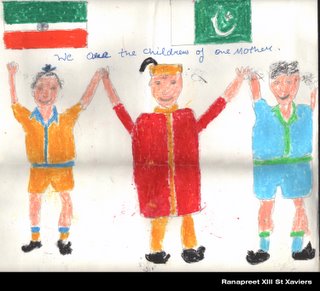
Housecalls magazine, December 2005
The two lanky Americans have been greeted with garlands and huge crowds upon their arrival at train stations, have addressed large gatherings to discuss the importance of amity between India and Pakistan, and have even been endearingly addressed as ‘angels of peace’. A modern day sequel to Attenborough’s Gandhi? “Not quite”, says John Silliphant with a smile, “but Gandhiji’s search for truth has certainly been an inspiration for this initative.” The initiative – taking peace letters and cards from children across
Though their aim is greater peace among peoples, the two are not diplomats or ambassadors, and neither are they in
Their idea of seva does not conform to any particular religion, nor are they affiliated with any particular NGO. Their aim, John explains, “is to give all that we have, and make every moment an opportunity for service.” Their ‘giving-in-the-moment’ credo often leads to seva activities that cross the lines of social convention for many Indians. For instance, in the city of
Despite their unassuming modus operandi, the duo has been receiving accolades from Ahmedabad city officials and citizens alike. The municipality has praised them for their work, and has agreed to their innovative proposal to install attractive dustbins throughout the city with the help of well-known architect Yatin Pandya. In an effort to highlight the importance of sanitation, Ahmedabad’s commissioner Anil Mukim, has even agreed to join the two on a day of cleaning public toilets. Anandiben, a slumdweller who was blinded when her husband threw acid on her 5 years ago, fondly refers to Mark as her ‘very good friend’. While walking through the Tekra slums one day, Mark noticed Anandiben sitting, depressed and unable to move, in an unlit room. Mark brought her to a local NGO called Manav Sadhna, a move that has transformed her life. “You can never imagine you are giving anything away - you always end up receiving so much more in return,” Mark says, “Anandi and her family have adopted me as an older brother into their family and showered me with genuine affection. I literally have a second home now.” In their 6 months in the city, the two were involved in numerous activities ranging from opening a Seva Café to tree-planting; until the government told them in early August that they had to leave the country within the next few days.
The order stunned the two. They were on 6 month tourist visas in the country, and hoped to bypass the expensive exit-and-reentry requirement by demonstrating to officials their service-intentions. Yet the government was adamant; they had to leave. While many might begrudge the government and leave the country embittered, John and Mark arrived at a Gandhian solution to their predicament: why not go to
In
The two now plan to travel the country until October spreading messages of peace and collecting cards, after which they will carry the cards to